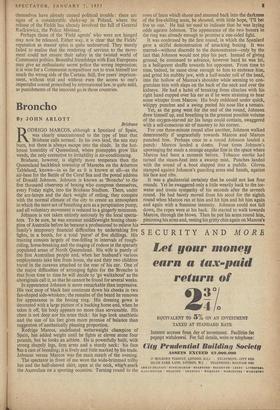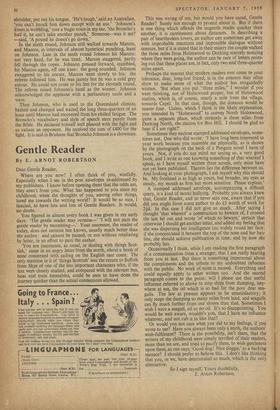Broncho
By JOHN ARLOTT Brisbane ODRIGO MARCOS, although a Spaniard of Spain, was clearly unaccustomed to the type of heat that Brisbane calls normal. In his own land, the sun may burn, but there is always escape into the shade. In the hot- house humidity of Queensland, where pineapples grow like weeds, the only corrective to irritability is air-conditioning.
Brisbane, however, is slightly more temperate than the Queensland backblock township of Mareeba on the Atherton Tableland, known—in so far as it is known at all—as the air-base for the Battle of the Coral Sea and the postal address of Donald Johnson. Johnson is known as 'Broncho' to the five thousand observers of boxing who compress themselves, every Friday night, into the Brisbane Stadium. There, under the arc-lamps and the dark weight of ceiling, they conspire with the normal climate of the city to create an atmosphere in which the mere act of breathing acts as a perspiration pump, and all voluntary movement is reduced to a gingerly minimum.
Johnson is not taken entirely seriously by the local specta- tors. To be sure, he was amateur middleweight boxing cham- pion of Australia before he became a professional to relieve his family's temporary financial difficulties by undertaking five fights, in a booth, for a total 'purse' of five shillings. His training consists largely of tree-felling in intervals of rough- riding, horse-breaking and the staging of rodeos in the sparsely populated areas of North Queensland. His wife is purely of the first Australian people and, when her husband's various employments take him from home, she and their two children travel in the caravan attached to the rear of his car. One of the major difficulties of arranging fights for the Broncho is that from time to time he will decide to 'go walkabout' as the aboriginals call it, so that he cannot be found for several weeks.
In appearance Johnson is more remarkable than impressive. His vast mop of black hair continues down his cheeks in two fan-shaped side-whiskers; the remains of the beard he removes for appearance in the boxing ring. His dressing gown is decorated with a large picture of a bucking horse and, when he takes it off, his body appears no more than serviceable. His chest is not deep nor his arms thick: his legs look unathletic and the size of his feet gives more promise of balance than suggestion of aesthetically pleasing proportion.
Rodrigo Marcos, undefeated welterweight champion of Spain, has added weight until he fights at eleven stone four pounds, but he looks an athlete. He is powerfully built, with strong shapely legs, firm arms and a sturdy neck: his face has a cast of breeding; it is lively and little marked by his trade. Johnson versus Marcos was the main match of the evening.
The spectator in front of me wore the wide-brimmed trilby hat and the half-sleeved shirt, open at the neck, which mark the Australian on a sporting occasion. Turning round to the rows of faces which shone and steamed back into the darkness of the five-shilling seats, he shouted, with little hope, 'I'll bet five to one.' He had no need to indicate that he was laying odds against Johnson. The appearance of the two boxers in the ring was already enough to promise a one-sided fight.
It was confirmed by the first round, in which the Spaniard gave a skilful demonstration of attacking boxing. It was marred—without discredit to the demonstrator—only by the fact that Johnson would not play his part. Instead of giving ground, he continued to advance, however hard he was hit, in a belligerent shuffle towards his opponent. From time to time, indeed, he came close enough to him to embrace him, and grind his stubbly jaw, with a half-tender roll of the head, into the hollow of Marcos's shoulder while seeming to con- gratulate him with slaps on the back of the neck and over the kidneys. He had a habit of breaking from clinches with his right hand cupped over his ear as if he were straining to hear some whisper from Marcos. His body reddened under quick, whippy punches and a swing peeled his nose like a tomato.
Yet, as the gong went for .the end of the round, Johnson drew himself up, and breathing in the greatest possible volume of the oxygen-starved air his lungs could contain, swaggered with a self-conscious air of mastery to his corner.
For one three-minute round after another, Johnson walked determinedly if ungracefully towards Marcos and Marcos punched him. Perhaps once in a round Johnson landed a punch: Marcos landed a dozen. Four times Johnson's upswinging fist made a strange angular line in the space where Marcos had been a moment before. Tobacco smoke had turned the steam-heat into a swamp mist. Punches landed with the sound of a boot slapped into a puddle. Gloves stamped against Johnson's guarding arms and hands, against his face and ribs.
It was a gladiatorial certainty that he could not last four rounds. Yet he swaggered only a little wearily back to the ice- water and ironic sympathy of his seconds after the seventh round. He had barely moved from his stool for the eighth round when Marcos ran at him and hit him and hit him again and again with a feminine intensity. Johnson could not fall down, the ropes were at his back. He started to walk towards Marcos, through the blows. Then he put his arms round him, pinioning his arms and, resting his gritty chin again on Marcos's shoulder, put out his tongue. 'He's tough,' said an Australian, `you can't knock him down except with an axe.' Johnson's knees is wobbling,' tore a bugle voice in my ear, 'the Broncho's had it, he can't take another punch,' Someone—was it me? —said, 'A pound he doesn't go down.' In the ninth round, Johnson still walked towards Marcos, and Marcos, in intervals of almost hysterical punching, leant on Johnson. Late in the tenth round Johnson hit Marcos: not very hard, for he was tired. Marcos staggered, partly fell through the ropes. Johnson pressed forward, stumbled, hit Marcos again, off one knee: the gong sounded. Johnson swaggered to his corner, Marcos went slowly to his: the referee followed him. He was jaunty but he was a cold grey colour. He could not come to his feet for the eleventh round. The referee raised Johnson's hand as the winner. Johnson acknowledged the applause with a perfunctory smile and a wave.
Then Johnson, who is used to the Queensland climate, bathed and changed and waited the long three-quarters of an hour until Marcos had recovered from his chilled fatigue. The Broncho's vocabulary and style of speech stem purely from the Bible. He declared himself well pleased with the fight and so valiant an opponent. He received the sum of £400 for the fight. It is said in Brisbane thatBroncho Johnson is a showman,















































 Previous page
Previous page